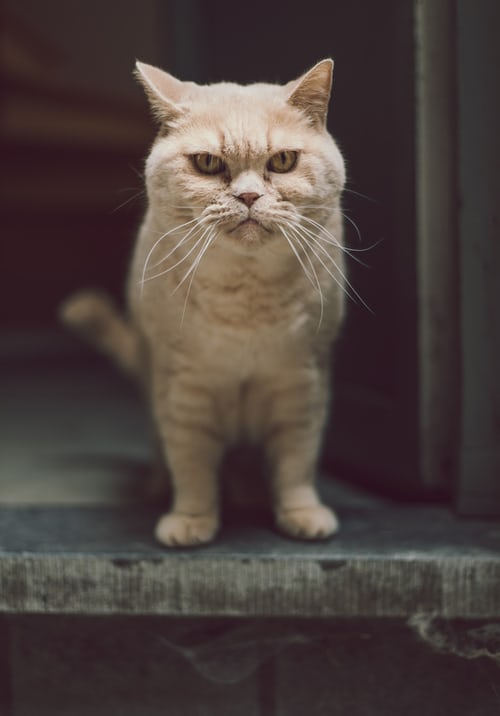Frank Skinner once told a joke which went a bit like the following about the difference between cats and dogs:
“Imagine a scenario,” he said, “you are putting up a picture, and your pets are watching you. Your dog, there he is looking adoringly up at you, and his whole demeanour is saying: ‘You are wonderful, you are so fabulous, I love the way you hang that… You didn’t need to look too closely or think about the straightness, although I love the way you quietly meditated on the task beforehand for 20 minutes or so – class. You went straight in and hung it first time pretty much with a hit of stylish jauntiness. I love you.’”

“The cat on the other hand, is glaring blankly at you from the top of the sofa. His whole demeanour saying: ‘You’ve done it again, gone straight in there, no preparation – unless you count the 20 minutes you spent in a catatonic state staring at the wall, and then the picture, and then the wall; and well, frankly I wouldn’t have done it like that if I were you. It’s all “off piste”. I bet you think it’s at a cute and jaunty angle… you really are a bit hopeless…’”

So funny! Obviously not only feeding into our prejudices about the nature of cats and dogs, but for me it illustrates the extremes of self-talk that we sometimes have going on in our head, as a running commentary of our life and our behaviour. Neither is helpful in the above extreme example.
At one end of the scale, there is the mixture of narcissism and fear that you are inflicting on yourself with these thoughts that encourage you to think that everything you do is wonderful – because that is what being positive is all about isn’t it? Everyone knows that positive thinking gets results, and if we just deny any fear, and refuse to consider whether we could do something a better way and put a bit of time into thinking about it rationally, then we’ll be and feel wonderful and banish any feeling of failure!
At the other end, is the sneering and fear that you inflict on yourself and become frozen with poor self esteem and inflect a negative pattern of belief that ensures you stay right there. Whether the task needs just a little, or a lot of thought, and you waste the time just feeling your feeling of ‘what if I can’t do it, I should be able to do this without help, but I am just no good at this sort of thing, I’ll just do it or I will just refuse to have a go’ and then do it badly. As you set yourself up to do.
Like the joke, it is an extreme picture, however, many clients I have spoken to about it, once they have stopped laughing, have recognised elements of the cat and dog version of self-talk going on in their head. The common factor of course is that both positions are ultimately fuelled by fear. Take a deep breath, calm down the fear, spark off the creativity in you instead, and stretch your comfort zone.
The self-talk we need is the balanced, ‘best friend’ approach. The one who pragmatically assesses what they need to do and looks at how to do it. The best friend is Kind, not infatuated, gives feedback without judgement, while not being afraid to suggest that it could be improved. Taking the ‘life and death’ way out of talking to ourselves is so much more relaxing and constructive:
- Be kind to yourself and avoid delusion!
- If you think you can’t, you probably can’t, so eliminate the word from your thoughts and focus on how you could do it without the unhelpful pre-judgement.
- Thoughts are not facts, they are projections and more akin to fiction. You are in charge of them, so change them to support you in what you are trying to do, rather than scupper you, or hide behind arrogance.
In many ways, the small children who create an ‘imaginary friend’ to play with when they are feeling lonely or challenged have got quite a good idea, I often think. It is recognising that you can create your own friend who will comfort you, support you, and at the same time encourage you to do your best; to dream and also to put the work in. If you can take one step further up and move that good friend into your heart space, then you can start to ‘be’ your own best friend.
We are all ultimately on our own, so be on your own with a great true, friend. It’s good to have the odd bit of adoring dog and cautioning cat in there, but avoid the cacophony of cats and dogs woofing and meowing in your head, creating panic and delusion.
Be the true friend to yourself that you need and you will have all you need to be true to yourself and grow.
Happy New Year my friends, let’s hope it IS a good one for us and the World.
I am running three Masterclasses this January and February 2021 that you may be interested in, so if you would like to find out more, and know how I can help you to gain confidence (and actually enjoy) speaking, contact Fiona Whytehead at fiona@locuscoaching.com or visit the website at www.locuscoaching.com.


Leave a comment
Required fields are marked *. Your email address will not be published.